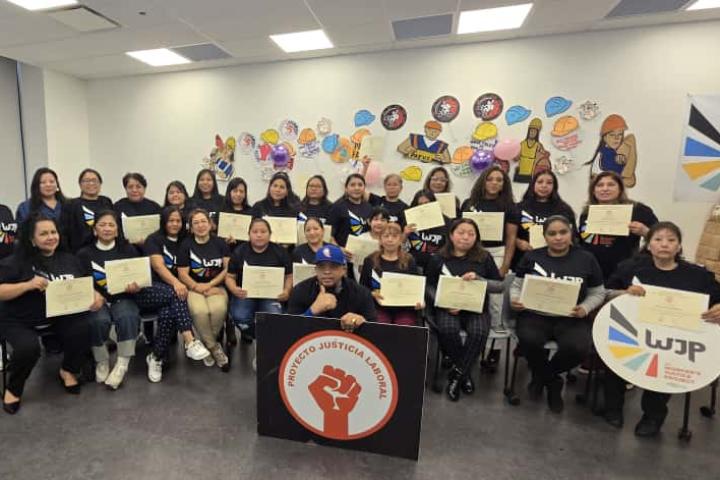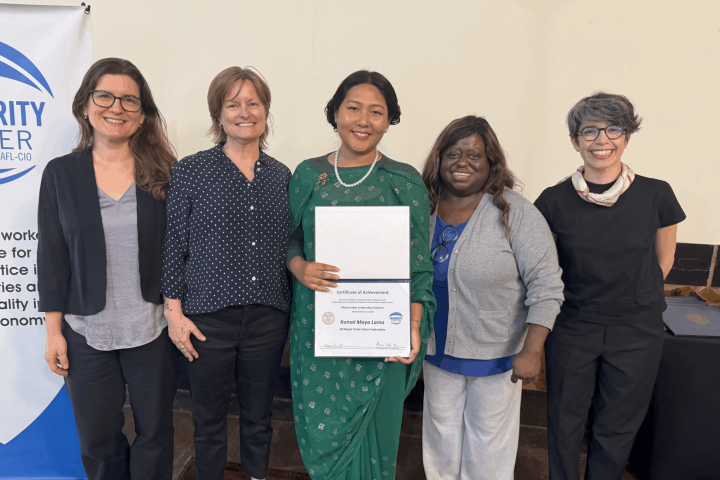
Two ILRies leading Outreach institutes are informing the national conversation around the historic union organizing shift.
As Cathy Creighton ’87 and Patricia Campos-Medina ’96, MPS ’97, moved through ILR as undergraduates and into their careers in labor, U.S. unions steadily declined.
Organized labor was seen by many to be a thing of the past.
Well, labor is having a moment.
Creighton and Campos-Medina, who went to work in different facets of the labor movement, say their ILR education taught them that transforming the future of work also meant transforming labor relations in a manner that advances the welfare and rights of workers.
Spurred by pandemic-related issues, many workers organized to protect themselves from unsafe working conditions. After two years of working as essential workers, in March, the unimaginable occurred when Amazon workers at a Staten Island warehouse voted to unionize. Workers at more than 200 Starbucks’ locations filed petitions to organize.
During these developments, Creighton, director of the ILR Buffalo Co-Lab, and Campos-Medina, executive director of ILR’s Worker Institute, have been putting their education and experience to work in roles they now hold at ILR after years in other positions elsewhere that tapped into their educational background.

After graduating from ILR, Campos-Medina joined the labor movement as a strategic campaign researcher for the labor union UNITE. It was the key union fighting
for workers rights in the U.S.-based apparel and textile industry, with a work force mainly of women immigrant workers. That job led to a 15-year career as a union, legislative and political strategic campaigner for other low-wage unions such as UNITEHERE and SEIU, unions at the forefront of innovation in low-wage and immigrant worker organizing. Later, she had a career in politics, working in policymaking in New Jersey and Washington, D.C.
Creighton went from ILR to Boston University for law school, and then went to work as a labor attorney for the next three decades; first for the National Labor Relations Board as a field attorney, and then as an attorney in private practice where she founded Creighton, Pearce, Johnsen & Giroux, representing dozens of public and private sector unions.
Now, decades after graduating, both are frequent commentators in top-tier media on story developments few thought possible just a couple of years ago.
“Worker organizing activity is on the rise, from strikes to walk-outs, to union elections filings, to sporadic worker-led action on the production floors. This level of worker led activity is organic and demonstrates the fundamental shift occurring in U.S. employment relations,” Campos-Medina said.

Creighton said, “The pandemic laid bare certain truths: that workers need a voice in their workplace to literally protect themselves from disease, illness and death, and that workers want a say in the quality of their work life including not just wages and benefits, but how their work impacts the environment, and racial and economic inequities in the U.S.”
“It is extremely gratifying to see workers rising up and succeeding despite the threats to their livelihood and the millions of dollars employers are spending in union avoidance firms to defeat them,” she said.”To be directing Cornell ILR in Buffalo at the same time that the Buffalo Starbucks workers are leading the national unionization surge, provides an incredible opportunity to study the movement,” she said.
They also share their insight with ILR students and professionals through the High Road program, the Union Leadership Institute and other initiatives. This summer, for instance, Carson Taylor ’23, a High Road fellow, will work with the Starbucks United organizing campaign through an opportunity facilitated by Creighton.
At ILR, they work alongside some of the professors they learned from. Campos-Medina shares leadership of the Worker Institute with Professor Risa Lieberwitz, the institute’s academic director. Lieberwitz was Campos-Medina’s labor and employment law professor. “Risa taught me how critical the law is to safeguard rights for people. However, my activism at ILR through Cornell Organization for Labor Action also taught me that the law only works when workers have access to a system that helps them demand protection. That system only works when unions and worker advocates are organized and help workers demand equal protection under the law.”
Creighton says she was inspired by Professor George Brooks to go to law school and work for unions. “Professor Brooks taught a union democracy class.s about the importance of workplace democracy, and how the National Labor Relations Act provided a way for workers to have some measure of control of their economic life. He was a former organizer in the paper industry. Amazing man.”
More stories about the ILR School’s expertise around organizing efforts can be found here:
"No” Vote Seen as Setback that Won’t Diminish Worker Momentum
What Happened at the Amazon Warehouse on Long Island?
Opportunity to Expand the Pie: Katz Op-Ed
ILR Research Informs Multiple Audiences
Labor Tracker Serves as Resource
Worker Institute Helps Guide Energized Labor Movement


